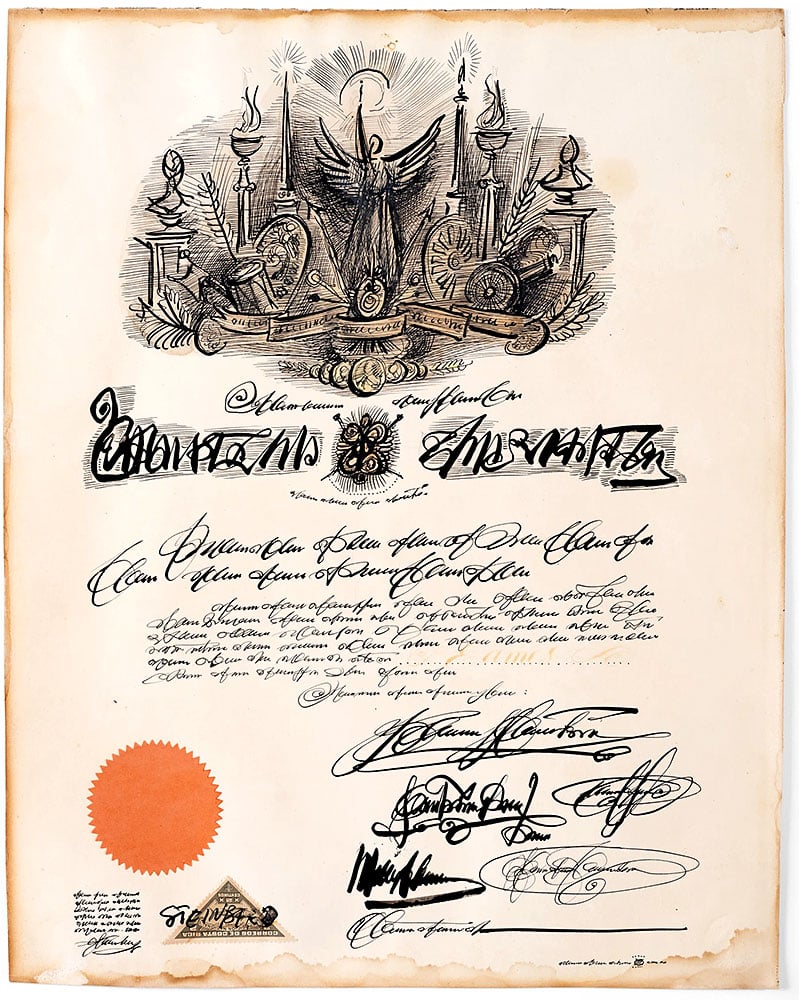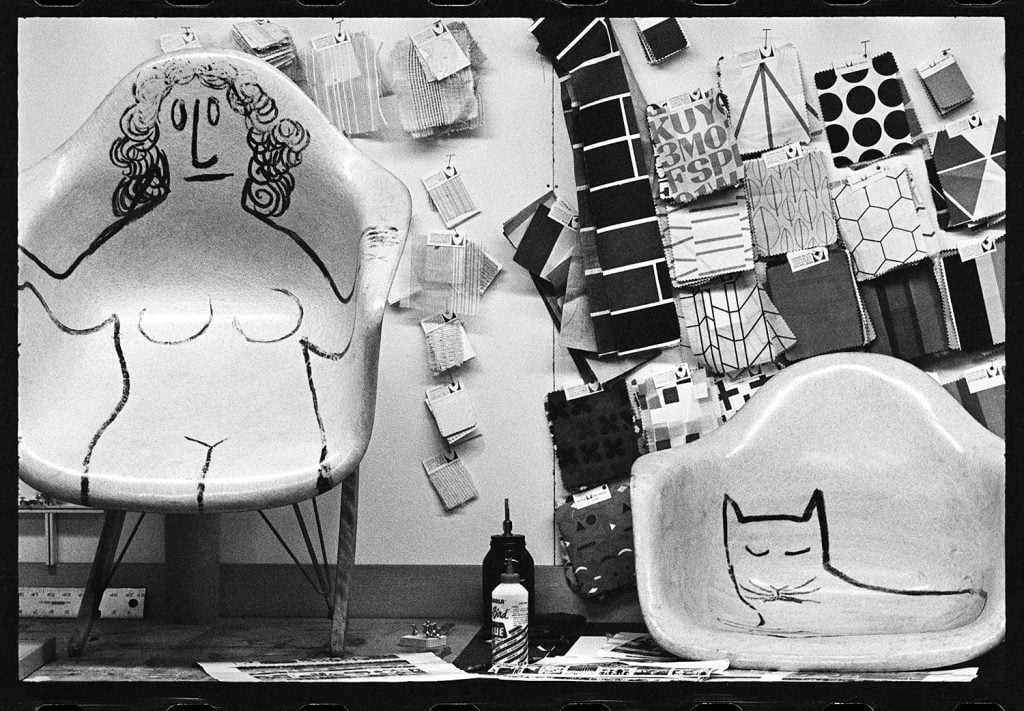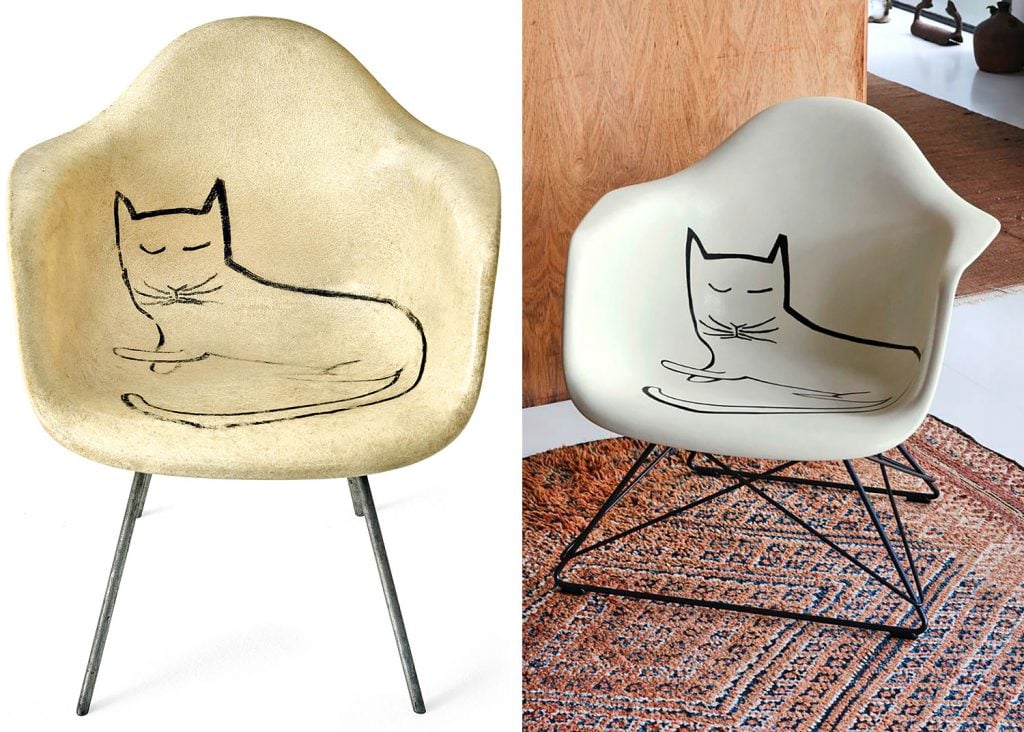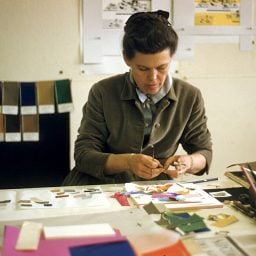Launched in 1950, the Charles and Ray Eames-designed shell chairs were the first mass-produced furniture item in which the seat and backrest were formed from a single unified piece of plastic. That same year, the designing couple invited their friend, Saul Steinberg, the illustrator best known for his cartoon-like musings in The New Yorker—he described himself as “a writer who draws”—to visit them. While on the West Coast with his wife, Hedda Sterne, Steinberg made the fateful trip to the Eameses’ office in Venice, California.
Together the three eccentrics overflowed with imagination, creating an array of one-off art objects. Take, for instance, an official-looking yet totally made-up college degree that Steinberg drafted for Charles Eames (who left architecture school before graduating) and an actual bathtub on which Steinberg painted the outline of a bathing woman. Archival photographs have also been discovered from around this time showing Steinberg’s whimsical drawings projected onto his wife and Ray Eames.

Saul Steinberg’s fake college degree for Charles Eames (c. 1950). Courtesy of the Eames Institute.
“The interconnection of Steinberg’s ideas and how this overlapped into the designs of my grandparents is incredible,” said Llisa Demetrios, the Eames’s youngest granddaughter and the chief curator of the Eames Institute, who looks after the family’s art and design legacy. “I think this collaboration is exemplary of how they liked to create—always open to another creative iteration, going beyond what’s expected.”
“Steinberg was ever-observant of America’s changing cultural landscape,” said scholar Francesca Pellicciari, co-curator of “Saul Steinberg: Milan, New York” at the 2021 Triennale di Milano. “[He] seemed to delight in the widening gulf between popular tastes and the vanguard of modernist art and design.” Indeed, by the 1950s he had a made a name for himself as a painter and muralist in the absurdist vein, beyond his wry cartoons for The New Yorker. In 1946, he was included in the group exhibition “Fourteen Americans” at MoMA, exhibiting alongside Arshile Gorky, Isamu Noguchi, and Robert Motherwell.

Courtesy of Eames Office, LLC.
At some point during his creative carousing with the Eameses, Steinberg applied his wit and humor to two of those shell chairs. On one, he drew the rough outline of a napping cat and on the other a naked woman. The Eameses held onto those chairs, which they correctly understood to be more than the byproduct of two couples having a good time. Now, more than 70 years later, the Eames Institute had the cat chair scanned and faithfully reproduced by Vitra and furniture company Herman Miller, down to the hand-drawn whiskers. The new model, in a limited edition of 500, is available for $2,500.
More Trending Stories:
A German Museum Came Up With an Insanely Low-Tech Solution to Protect Its Rembrandt Canvas From a Leaky Ceiling
A U.S. Judge Permanently Banned Digital Artist Mason Rothschild From Selling His ‘MetaBirkin’ NFTs, Handing a Win to Hermès
A Frank Frazetta Painting of a Brawny Warrior Sold for $6 Million, Making It the World’s Highest-Priced Work of Comic Book or Fantasy Art Ever
A 17th-Century Double Portrait of Black and White Women, Said to Be of ‘Outstanding Significance’ Will Remain in the U.K.
Art Industry News: South Korean Student Thought a Museum Wanted Him to Eat the $120,000 Duct-Taped Banana + Other Stories
This Famed Dollhouse Is Hung With Tiny Original Artworks, Including a Miniature Duchamp. Here Are Three Things to Know About the One-of-a-Kind Treasure
Elisabetta Sirani Painted in Public to Prove Her Work Was Her Own. Here’s How She Became a 17th-Century Star—and Why She’s Being Remembered Now











